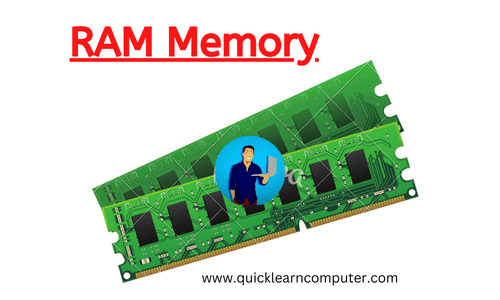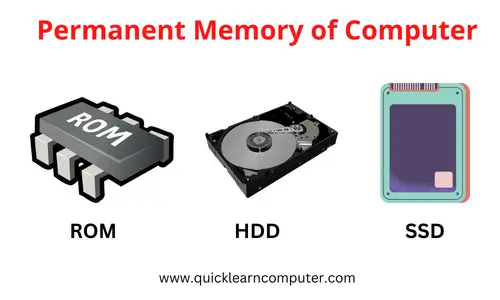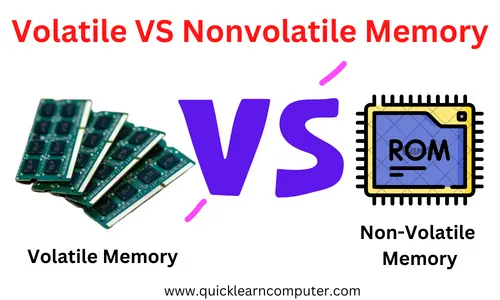Hello Learners, Today we will know What is Volatile Memory and Non-Volatile Memory?
In this post, I will explain Volatile Memory and Non-Volatile Memory in computers in detail.
This Article is the Best on the whole internet.
If you read this article carefully you will understand all about the Advantages, Disadvantages, and differences between Volatile Memory and Non-Volatile Memory.
I Guaranteed you, after reading this article you will not need to read any other Articles. In fact, our readers are satisfied with this blog post.
Note - The only purpose of this article is to tell you about Volatile VS Non-Volatile Memory in very simple language. This article has been written by an expert, if you think this article can be improved further, then you must give us feedback.
What is Volatile Memory?
Volatile memory, also known as primary storage or temporary memory, is a types of computer memory that stores data and stored data is deleted when the power is turned off. Random Access Memory (RAM) is a Volatile Memory.
This type of memory requires constant electrical power to hold stored data, which makes it faster than non-volatile memory like hard disk drives and solid-state drives.

Picture of Volatile Memory
As a result, volatile memory is often used for short-term data storage and manipulation applications such as reading/writing from RAM (Random Access Memory) on processors or GPUs (Graphics Processing Units).
It can also be used to store program instructions or operating systems programs temporarily while in use. Volatility typically ranges from nanoseconds to milliseconds depending upon the technology used.
Two different types of volatile memory are DRAM (Dynamic Random Access Memory) and SRAM (Static Random Access Memory).
What is Non-Volatile Memory?
Non-Volatile Memory (NVM) is a type of computer memory that is used for the task of permanent memory and retains its data as well when the power is turned off, while Volatile Memory requires constant power to retain its data.
NVM can serve as both main memory and storage in embedded systems, meaning it can be used for short-term storage in RAM and long-term storage on Flash or EEPROM chips.

Picture of Non-Volatile Memory
It is usually much faster than traditional hard disk drives, allowing applications to run more quickly with less time spent waiting for data to load.
NVM also offers higher security as the data is stored on underlying hardware rather than simply on a hard drive which can be easily accessed by malicious factors.
Additionally, because NVM does not require power to maintain its data it is highly resilient to the loss of power or system crashes. This makes NVM ideal for critical applications such as safety-critical embedded systems where non-volatility and robustness are essential requirements.
Why Do Computers Have Volatile Memory?
Computers have volatile memory because it allows them to store data temporarily while their programs or software are running.
When the computer is turned off, the content of this memory is erased and must be loaded again when the machine turns on. This makes volatile memory ideal for storing information that is frequently accessed during a set time period.
It also ensures that data remains safe even if there is an unexpected power outage or other issues, preventing costly data losses. Volatile memory also helps protect sensitive information from unauthorized access since any active data can be wiped from it quickly and easily when needed.
Computers with volatile memory need less physical space to store large amounts of information and can allow faster access to the stored files than non-volatile storage systems like hard drives or solid-state drives.
Additionally, since the content of volatile memory doesn’t remain for long periods of time, it requires fewer resources to keep up with changes in its contents and therefore uses less energy than other forms of digital storage media.
Advantages of Volatile Memory
There are multiple advantages of Volatile memory, which are given below.
- Volatile Memory is incredibly fast compared to other computer storage and is used to store data and instructions for quick access.
- It provides a number of advantages over non-volatile memory, such as Hard Disk Drives (HDDs). One major benefit is that it can provide almost instantaneous access to data stored in RAM, allowing faster program execution than with HDDs.
- In addition, RAM can be erased or rewritten almost instantly, making it easier to update information quickly and efficiently without having to transfer files from hard disk to ram each time.
- Furthermore, volatile memory offers faster read/write speeds than HDD which helps speed up processes and cut down processing times when performing demanding tasks like gaming or intensive graphical design work.
- Additionally, volatile memory only holds data while the computer is powered on. Finally, volatile memory requires less power than HDDs because it does not need mechanical components and therefore isn’t subject to wear and tear as HDD can be.
- This makes RAM ideal for use in mobile computers where battery life needs to be conserved. All these benefits combined make volatile memory an invaluable part of a computer system as it not only increases its performance but also keeps your files safe and secure.
Disadvantages of Volatile Memory
There are multiple disadvantages of Volatile memory, which are given below.
- Volatile memory, such as RAM, has some distinct disadvantages. One of the most prominent is its reliance on a constant source of power to retain data. If the power suddenly gets cut off or fails, any data stored in volatile memory will be lost instantly and permanently.
- volatile memory is finite and often expensive compared to Non-volatile Memories like hard disks or solid-state drives. Additionally, volatile memory only exists for a short time period before it must be refreshed.
- In volatile Memory, more space is required for larger amounts of data and due to less stored data capacity so volatile memory slows performance.
- RAM is non-persistent by nature it can not be utilized as a reliable form of storage by programs or maintenance tasks which require frequent accesses or prolonged operations over long periods of time without failures occurring periodically.
Difference between Volatile Memory and Non-Volatile Memory
There are various differences between both the memory, which are discussed below.

Volatile Memory | Non-Volatile Memory |
Volatile Memory is a type of computer memory that when power is off, so stores data in this memory will be deleted. | Non-Volatile Memory is a type of computer memory that when the power is off, data stored in this memory is not deleted. |
Data of Volatile memory are stored temporarily. | Data of Non-Volatile memory are stored permanently. |
Volatile Memory is faster than other computer memories. | This Memory is slower compared to volatile memory. |
RAM Memory is an example of volatile memory. | ROM Memory is an example of Non-Volatile Memory. |
Volatile Memory is capable to transfer data very easily compared to non-volatile memory. | Non-Volatile Memory is not capable to transfer data very easily compared to volatile memory. |
Volatile memory is capable to read and write data. | Non-Volatile memory is capable to read only data. |
Volatile memory has less data storage capacity which is capable to stores a small amount of data. | Non-volatile memory has a large data storage capacity which stores more data than volatile memory. |
Volatile memory is more costly compared to Non-Volatile Memory. | Non-volatile memory is not more expensive compared to Volatile Memory. |
Volatile memory increases the system’s performance which systems are work faster. | Non-Volatile Memory impact a system’s storage capacity. |
FAQS
Which is an example of non-volatile memory?
Examples of non-volatile memory are - hard disks, solid-state drives, magnetic tape, floppy disks, etc.
Why ROM is non-volatile memory?
because the stored data in ROM Memory is permanent, this memory is not dependent on electric current to store data. That's why the data of this memory is not lost when electrical power is cut.
Which device has volatile memory?
Volatile Memory in various devices such as - PC, laptops, Mobile Phones, smartwatches, and Smart TVs.
Which is temporary RAM or ROM?
RAM is temporary memory because RAM is capable of storing any data for a short period of time.